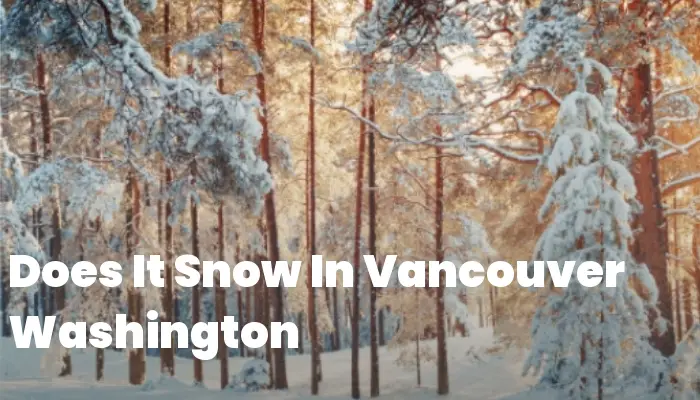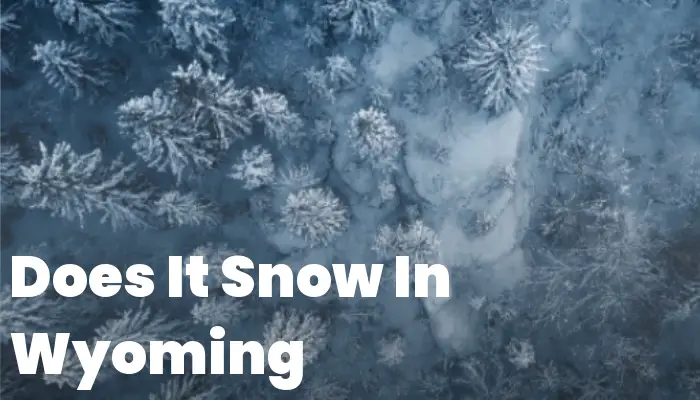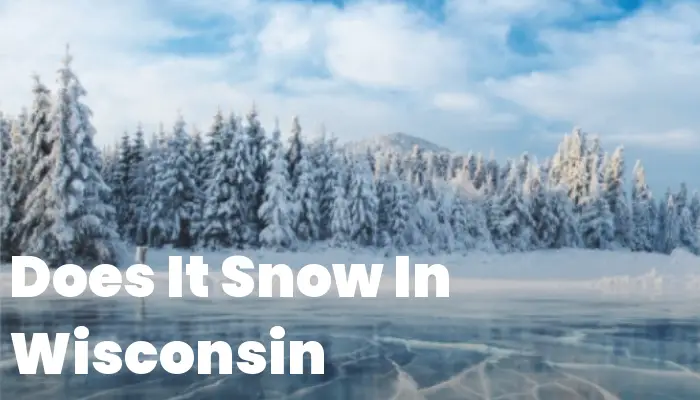Wondering about the winter weather in the Pacific Northwest? In particular, “Does it Snow in Vancouver Washington?” Join us as we delve into the climate of this unique city, exploring its seasonal variations and annual averages.
You may be surprised by what you find out about this city’s weather patterns and how it compares to other locations in Washington state. Whether you’re planning a winter visit or considering moving to Vancouver, your questions about snowy weather will be answered here. Stay tuned!
Does It Snow In Vancouver Washington?
When it comes to winter weather, many are curious about the snowfall in Vancouver, Washington. While not as well-known for heavy snow as some other parts of the country, Vancouver does experience its share of the white stuff. Located in the southwest region of Washington State and adjacent to Portland, Oregon, this city’s climate is influenced by both its proximity to the Pacific Ocean and the Cascades mountain range.
Typically, residents witness a delicate balance between moderate Pacific Northwest weather patterns and occasional cold snaps that can bring snowfall to the area. Unlike some regions where snow is a constant companion throughout winter months, in Vancouver, snow is a more sporadic visitor. It’s not uncommon for some winters to pass with just a few light dustings or even no measurable accumulation at all.
However, that doesn’t mean Vancouver is immune to significant snowy events. Every few years, cold Arctic air might funnel down into the region, meshing with moisture from western weather systems and resulting in days where neighborhoods transform into winter wonderlands. For those wondering if they’ll need their snow boots when visiting or moving here during winter—it’s best to keep an eye on forecasts as weather can vary significantly from year to year.
How Much Does It Snow In Vancouver Washington?
Digging deeper into snowfall averages, Vancouver experiences a relatively modest amount compared to other parts of Washington State or even cities further east in Clark County. The annual average for this city hovers around 3-4 inches; however, this number can be misleading as it varies greatly from one year to another.
If you’re imagining thick blankets of snow covering rooftops throughout an entire season—Vancouver typically won’t meet those expectations. Snow tends to fall lightly and often melts away rather quickly due to generally mild daytime temperatures during winter months. That said, every once in awhile (perhaps every 2-4 years), significant snowstorms have been known to hit the area leading residents scrambling for their shovels with accumulations sometimes exceeding 10 inches or more.
For those keeping detailed records or simply interested in stats: monthly breakdowns indicate that December through February are the prime months for potential snowfall—with February often being peak month thanks largely in part due to colder seasonal temperatures creating ideal conditions for precipitation turning into snowflakes.
Are There Ice Storms In Vancouver Washington?
In addition to wondering about snowfall amounts—one must consider another wintry element: ice storms. These events can be far more debilitating than mere accumulation of powdery white flakes; ice presents slippery roads causing travel chaos and risks of downed trees and power lines due heavy glazing on branches.
Ice storms may not occur annually but they do pose a considerable threat when they do come about—especially since many locals might not be well-equipped with tools like tire chains or accustomed driving on icy streets given how infrequently such conditions arise.
The topography surrounding Vancouver doesn’t help matters; hills found throughout city limits only exacerbate hazardous conditions during icy spells leading school closures delays public transportation issues alike.
It’s important note however while ice storms represent serious concern they still remain relatively rare occurrence seen perhaps once every several years although climate change may possibly impact future frequency intensity these extreme weather episodes.
Vancouver, Washington, experiences a climate which includes snowfall during the winter months. According to the information provided in the article “Does It Snow In Washington,” even though snow is not as heavy or frequent compared to other regions in the state, residents and visitors can still witness a winter wonderland on occasion. The city’s geographical position means that it receives a moderate amount of snow annually, typically resulting in a few inches that cover the streets and landscapes, creating picturesque scenes. It is important for both locals and travelers to be prepared for these conditions by keeping abreast of weather forecasts and advisories during the colder season.
Where Does It Snow In Vancouver Washington?
Snow in Vancouver, Washington is location-dependent, with some areas receiving more snowfall than others due to elevation and proximity to the Columbia River Gorge. Generally speaking, the higher elevations in places like the neighborhoods near the foothills of the Cascade Range tend to see more snow accumulation. On the other hand, lower areas closer to sea level might witness less snowfall or only experience a brief dusting that melts away quickly.
The likelihood and amount of snow can also vary within city limits. North and East Vancouver often find themselves with a bit more snowfall when compared to downtown or areas closer to Portland due to microclimates created by urban heat islands. Furthermore, traveling eastward toward Camas and Washougal, one may encounter increasing amounts of snow because these cities are situated closer to the Gorge where cold east winds can enhance snowfall.
Residents living on the western side of Vancouver will notice that they may receive slightly less snow than those living on the eastern edges. The variation in topography means that it’s wise for locals to be aware of their specific neighborhood’s trends and prepare accordingly during winter months.
Vancouver Washington Roads and Winter Weather Conditions
Road conditions in Vancouver during winter weather events can be quite variable and depend heavily on timely responses from city services as well as individual preparedness. Main thoroughfares like Interstate 5 (I-5) and Highway 14 typically receive priority for plowing and deicing efforts which helps keep traffic flowing smoothly for commuters as well as commercial transport.
However, secondary roads and residential streets may not see such immediate attention leading them susceptible icy patches persistent coverage especially during heavier storms. For many residents navigating these routes requires caution patience particularly those who are not experienced driving under such conditions.
Public transportation, including buses operated by C-TRAN, may run on delayed schedules or modified routes during severe weather to ensure passenger safety although service interruptions cannot always be avoided if conditions worsen beyond manageable levels.
Community members urged stay informed about current road statuses through official channels such as local news outlets Department of Transportation updates before venturing out when there’s potential for hazardous travel due snow ice presence.
Tips For Safe Winter Driving In Vancouver:
– Equip your vehicle with appropriate tires designed for winter weather.
– Always carry an emergency kit complete with supplies like blankets, food water flashlight case unexpected situations arise.
– Plan trips allowing extra time reach destinations safely without rushing risking accidents icy slippery surfaces.
How Cold Does It Get In Vancouver Washington?
The temperature range throughout winter months spans from mild chilly days harsh cold nights making difficult predict just how bundled up you’ll need each day you head out door.Vancouver’s proximity Pacific Ocean typically results milder temperatures compared interior regions Pacific Northwest however this does preclude drops below freezing especially overnight hours evening without cloud cover insulate warmth radiated during day.
January generally considered coldest month year average low temperatures dipping into mid-30s°Fahrenheit occasionally dropping down into twenties single digits rare instances cold snaps grip region influx Arctic air mass.
Though daytime highs often rebound forties sometimes fifties providing respite from nightime chill still crucial dress layers keep warm avoid exposure elements over long periods particular vulnerable populations children elderly individuals chronic health issues.
Overall climate remains relatively temperate contrasted extremes found elsewhere United States still prudent prepare possibility very cold spells by ensuring homes vehicles properly insulated equipped handle whatever weather comes way helming edge Cascadia Subduction Zone seismic activity another factor consider when evaluating overall safety comfort area residents visitors alike.
Just like in Bellevue, Washington, it does occasionally snow in Vancouver, Washington as well. However, the snowfall isn’t as consistent when compared to some areas on the east coast. For instance, Charleston and Huntington in West Virginia experience more frequent snowfall during winter months. Meanwhile, places like Parkersburg, West Virginia, also witness a similar snowy climate. It’s fascinating to see how geographical location can influence weather patterns and conditions so significantly.
Regardless of where you are or where you might be going, it’s always a good idea to check for possible snow and prepare accordingly.
Winter Activities In Vancouver Washington
While the Vancouver, Washington area may not be a winter sports capital like some colder regions, there’s no shortage of activities to keep residents and visitors entertained during the chillier months. One of the most popular winter pastimes is embracing the great outdoors at nearby Mount Hood or Mount St. Helens where skiing, snowboarding, and snowshoeing opportunities abound.
Within the city itself, when snow does grace the landscape, local parks become hubs for family-friendly fun. Activities like sledding and building snowmen are common sights at places like Leverich Park and Esther Short Park after significant snowfall. For those who prefer to stay active indoors, ice skating can be enjoyed at Mountain View Ice Arena.
The city also hosts various winter events, such as holiday markets and festive light displays that add a touch of magic to the cold months. Moreover, local wineries and breweries often have seasonal offerings that are perfect for tasting on a crisp winter day.
Tips For Enjoying Winter Activities Safely:
– Dress in warm layers to retain body heat during outdoor excursions.
– Check weather conditions before heading out for any outdoor activities to ensure safety.
– Be aware of early nightfall in winter; plan activities so you’re not caught out after dark unexpectedly.
Winter Traveling In Vancouver Washington
Travelers coming to or departing from Vancouver during the winter season should plan accordingly considering potential weather disruptions. The Portland International Airport (PDX), which serves Vancouver residents due to its proximity across state lines in Oregon, sometimes faces delays or cancellations due to inclement weather.
For those driving into or out of Vancouver during winter months it’s critical that vehicles are prepared for all conditions they might encounter on roads ranging from clear dry asphalt icy streets blanketed with fresh snowfall.
Amtrak services, including lines running through Vancouver’s own station can suffer delays too so it’s wise check schedules frequently as they might change swiftly due weather-driven issues along tracks.
Tips For Hassle-Free Winter Travel:
– Allow extra time for airport security transportation potentially slower traffic.
– Monitor road travel advisories if planning a road trip – chains may be required over mountain passes.
– Keep family friends updated about your travel itinerary especially during long trips involving multiple stops unpredictable conditions.


